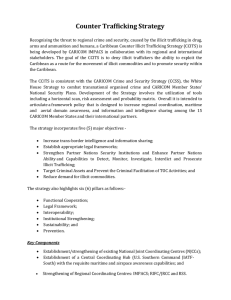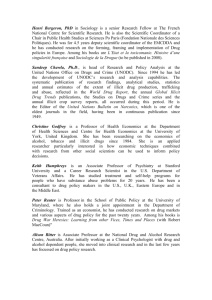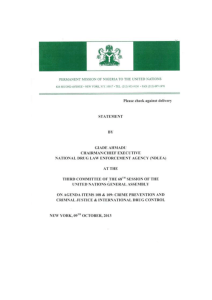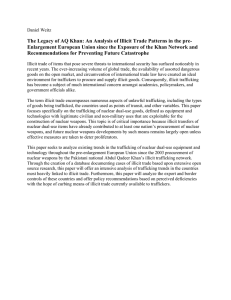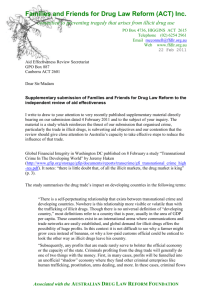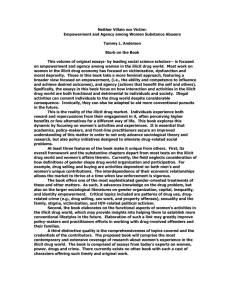IPE 382 The Illicit Global Economy
advertisement
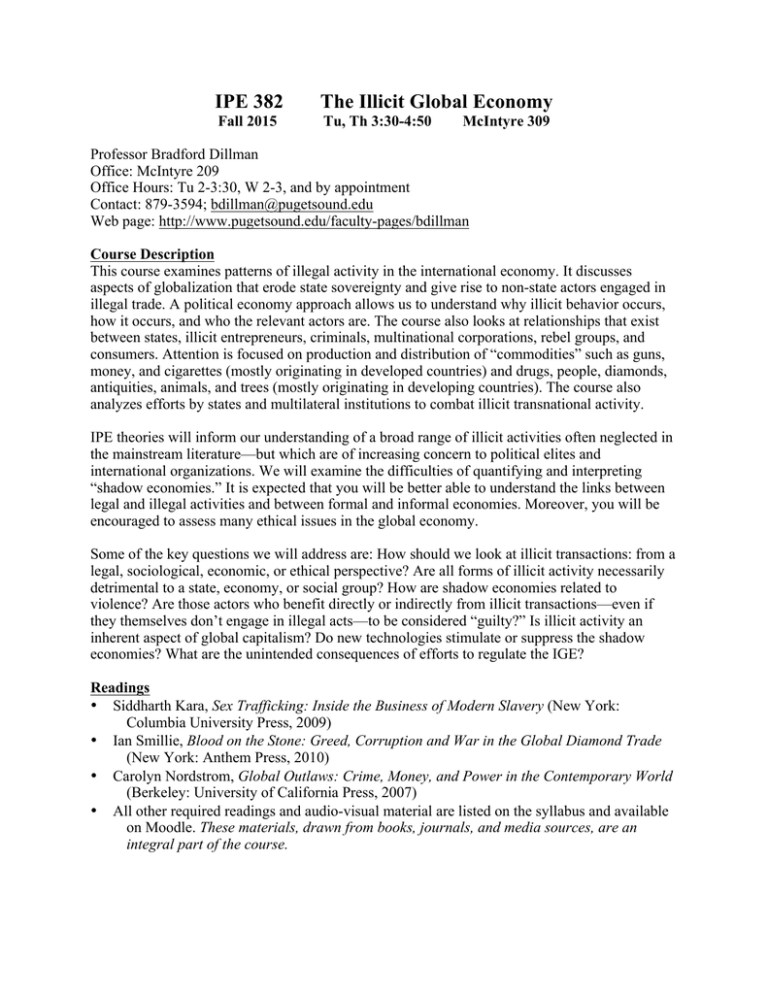
IPE 382 The Illicit Global Economy Fall 2015 Tu, Th 3:30-4:50 McIntyre 309 Professor Bradford Dillman Office: McIntyre 209 Office Hours: Tu 2-3:30, W 2-3, and by appointment Contact: 879-3594; bdillman@pugetsound.edu Web page: http://www.pugetsound.edu/faculty-pages/bdillman Course Description This course examines patterns of illegal activity in the international economy. It discusses aspects of globalization that erode state sovereignty and give rise to non-state actors engaged in illegal trade. A political economy approach allows us to understand why illicit behavior occurs, how it occurs, and who the relevant actors are. The course also looks at relationships that exist between states, illicit entrepreneurs, criminals, multinational corporations, rebel groups, and consumers. Attention is focused on production and distribution of “commodities” such as guns, money, and cigarettes (mostly originating in developed countries) and drugs, people, diamonds, antiquities, animals, and trees (mostly originating in developing countries). The course also analyzes efforts by states and multilateral institutions to combat illicit transnational activity. IPE theories will inform our understanding of a broad range of illicit activities often neglected in the mainstream literature—but which are of increasing concern to political elites and international organizations. We will examine the difficulties of quantifying and interpreting “shadow economies.” It is expected that you will be better able to understand the links between legal and illegal activities and between formal and informal economies. Moreover, you will be encouraged to assess many ethical issues in the global economy. Some of the key questions we will address are: How should we look at illicit transactions: from a legal, sociological, economic, or ethical perspective? Are all forms of illicit activity necessarily detrimental to a state, economy, or social group? How are shadow economies related to violence? Are those actors who benefit directly or indirectly from illicit transactions—even if they themselves don’t engage in illegal acts—to be considered “guilty?” Is illicit activity an inherent aspect of global capitalism? Do new technologies stimulate or suppress the shadow economies? What are the unintended consequences of efforts to regulate the IGE? Readings • Siddharth Kara, Sex Trafficking: Inside the Business of Modern Slavery (New York: Columbia University Press, 2009) • Ian Smillie, Blood on the Stone: Greed, Corruption and War in the Global Diamond Trade (New York: Anthem Press, 2010) • Carolyn Nordstrom, Global Outlaws: Crime, Money, and Power in the Contemporary World (Berkeley: University of California Press, 2007) • All other required readings and audio-visual material are listed on the syllabus and available on Moodle. These materials, drawn from books, journals, and media sources, are an integral part of the course. 2 Expectations ! ATTENDANCE: Regular attendance and punctuality are required. More than 3 absences will affect your participation grade. More than 5 unexcused absences will result in a failing grade for the course. ! EXAMS AND WRITING ASSIGNMENTS: I will hand out a study guide before each exam. Exams will likely consist of a combination of essays, short answers, and identifications. The final exam is not comprehensive; it primarily covers the material from after the midterm. Laptops are not to be used in class or for exams unless approved by the Office of Accessibility and Accommodations. Exams must be taken on the scheduled date unless there is a legitimate, documented reason for absence. Similarly, writing assignments must be turned in on the due date. Late papers will be penalized a half grade for each day late unless you provide documentation in advance of legitimate, extraordinary circumstances. ! PLAGAIRISM: It is your responsibility to be familiar with the Student Integrity Code and UPS’ policies on academic honesty—particularly with regard to the serious consequences for plagiarism—as explained in The Logger and at http://www.pugetsound.edu/studentlife/student-handbook/academic-handbook/academic-integrity. ! READINGS: It is important to read assigned materials before each class. I will often ask you in class discussions to answer specific questions about the assigned readings. ! PARTICIPATION: Your meaningful participation is what leads to a productive class. I expect thoughtful comments, consistent note-taking, and demonstrated engagement with class readings. Valuable participation also requires equanimity, respect for the opinions of fellow students, and the ability to assess issues with an open mind. Do not interrupt others who are talking, hog the conversation, or make flippant remarks. Your participation grade assesses a variety of factors including your intellectual curiosity, self-motivation, critical thinking, and every-day involvement in the class. I prefer that discussion proceed via raising of hands, so that that each person has an equal opportunity to join in. You can also expect me to call on you to answer questions. ! OFFICE VISITS: I expect you to stop by my office during the semester. Take the initiative to ask questions and engage in discussions with me. I am always interested in your opinions, observations, and materials that you come across that relate to intellectual property. Office of Accessibility and Accomodations If you have a physical, psychological, medical or learning disability that may impact your course work, please contact Peggy Perno, Director of the Office of Accessibility and Accommodations, 105 Howarth, 253-879-3395. She will determine with you what accommodations are necessary and appropriate. All information and documentation is confidential. Bereavement Policy Upon approval from the Dean of Students’ Office, students who experience a death in the family, including parent, grandparent, sibling, or persons living in the same household, are allowed three consecutive weekdays of excused absences, as negotiated with the Dean of Students. For more information, please see the Academic Handbook. 3 Classroom Emergency Response Please review university emergency preparedness and response procedures posted at www.pugetsound.edu/emergency/. There is a link on the university home page. Familiarize yourself with hall exit doors and the designated gathering area for your class and laboratory buildings. If building evacuation becomes necessary (e.g. earthquake), meet your instructor at the designated gathering area so she/he can account for your presence. Then wait for further instructions. Do not return to the building or classroom until advised by a university emergency response representative. If confronted by an act of violence, be prepared to make quick decisions to protect your safety. Flee the area by running away from the source of danger if you can safely do so. If this is not possible, shelter in place by securing classroom or lab doors and windows, closing blinds, and turning off room lights. Lie on the floor out of sight and away from windows and doors. Place cell phones or pagers on vibrate so that you can receive messages quietly. Wait for further instructions. Grading Your work is assessed on the basis of a number of criteria, including: depth of analysis; clarity; organization; strength of assertions; proper balance between description and analysis; knowledge of and reflection on assigned readings; and attention to grammar and punctuation. Take advantage of my written feedback and discussions with me to do your best work. 93-100 (A), 90-92 (A-) – Excellent 87-89 (B+), 83-86 (B) – Good 80-82 (B-) 77-79 (C+) – Satisfactory 73-76 (C), 70-72 (C-) – Below average 67-69 (D+), 63-66 (D), 60-62 (D-) – Poor Below 60 (F) – Failing Performance Measures ! Midterm Exam (25%) ! Final Exam (25%) ! Research Paper (25%) ! Homework assignments (15%) ! Participation and Attendance (10%) Homework assignments I will assign homework at various times during the semester. You will answer short questions about the readings or audiovisual material. I might ask you to review a feature film or documentary. These assignments (not more than 4) will be listed in Moodle at least 2 days before they are due. Written homework will be no more than 2 double-spaced pages in length. Assignments will assess your familiarity with the readings, allow you to express your own opinions, and prepare you for class discussion. Guidelines for the Research Paper Your paper will examine a topic of your choosing about the illicit global economy. Decide on a topic that has a fairly narrow focus and about which you can make some well-defined assertions and observations. At the beginning of the paper, state clearly what you are trying to explain, why 4 it is important, and what the reader should expect to learn by the end of the paper. This can often be done in several introductory paragraphs. Organize the paper in a logical progression. Your conclusion should be a reformulation—not repeat—of what you wrote earlier. Keep in mind that you should try to support your main thesis, not “prove” it. Make reasonable assertions, include supporting data, and acknowledge competing arguments. A strong paper will use a mix of books, journal articles, and Internet sources. The paper will be about 13 pages in length, using 1-inch margins and a 12-point font. Number your pages – starting with page 1 after the title page. Use the Chicago style of author-date parenthetical citation and referencing. Include a bibliography and a title page. When you cite the source of a quote, idea, or material you are paraphrasing, your citation must include the page number(s) you draw on from the source, unless the source has no fixed paged numbers. Opinions that are not originally yours must be cited. Direct quotations must be entirely enclosed in quotation marks. Avoid excessively close paraphrasing or use of just one source for several consecutive pages. Proofread for grammatical, syntactical, and spelling mistakes. Keep copies of your rough drafts. Don’t hesitate to seek assistance from me, the Writing Center, and the reference librarians. Due on Tuesday, November 17th. Here are some questions that you might want to focus your paper around: 1. Key questions, quandaries or dilemmas. Do you see the hydra effect, balloon effect, or restriction-opportunity dilemma in operation? 2. Methods for studying the market. How do we go about studying an illicit market? What do we know about the politics of numbers? Why are illicit problems always supposedly growing? 3. Drivers of the supply and demand. What causes the market to exist? Are structural reasons most important (war, fall of the Soviet Union, new technological developments, demand of the Great Unwashed, etc)? Or are the causes more proximate (specific to a country’s history, due to local factors, specific laws, etc)? 4. Routes and ways of circulation of the product. How does the product circulate through the global economy? What key states or regions are the weakest links that make the market hard to stop? 5. Actors. Who do we blame? What are the roles of specific middlemen? How are the actors organized (hierarchical, organized, loosely affiliated, based on ethnicity or national identity)? 6. Motivations and justifications of actors. How do we explain why illicit actors do what they do? What do actors themselves say in their own defense? Do the motivations spring from human depravity, greed, political goals, survival, or sense of injustice? 7. Idealized versions of the market. What are the best solutions? What are the debates about policy responses? What political factors seem to prevent ideal solutions from being adopted? 5 8. Human, social, and political consequences. Why do we care about illicit markets? What are their effects on human dignity, ethical and moral questions, the environment, government revenues, state sovereignty? 9. Metaphors and descriptors applied to the market. How do we talk about illicit markets? What are the metaphors, analogies, and other elements of discourse surrounding them? What are the myths and misconceptions, and why are they so resilient in the face of evidence that debunks them? Do education campaigns and public awareness efforts work? 10. Market suppressors: governments, IOs, and transnational advocacy networks (TANs). What do these market suppressors do to try to stop or minimize illicit markets? What are the rules, institutions, and treaties they have set up to deal with the problem? What interests are they pursuing? What are the politics behind efforts to create new policies and institutions to suppress an illicit market? How do TANs form, operate, and influence states and IOs? What are the unintended effects of suppression efforts (or legalization efforts)? What kinds of advocacy efforts do celebrities (glitterati) engage in? SOURCES TO CONSIDER: General sources • Journal: Crime, Law, and Social Change • www.journeyman.tv (Excellent documentaries with transcripts) • Transparency International www.transparency.org • United Nations Interregional Crime and Justice Research Institute www.unicri.it • Forced Labor Commodity Atlas www.verite.org/Commodities Timber • Timber. Peter Dauvergne and Jane Lister (Malden, MA: Polity Press, 2011). • www.illegal-logging.info • www.globalwitness.org/campaigns/environment/forests Electronics Waste • Basel Action Network www.ban.org/index.html • http://makeitfair.org • http://retroworks.blogspot.com (Waste in general, e-waste especially) • E-Waste Hell www.journeyman.tv/?lid=62718#62683 Fish • • The End of the Line: How Overfishing Is Changing the World and What We Eat. Charles Clover (Berkeley: University of California Press, 2007). http://www.ejfoundation.org/media/all/reports Conflict Minerals • Global Witness www.globalwitness.org/our-campaigns • www.enoughproject.org/blog_posts/Conflict%2BMinerals • http://eiti.org/ 6 Whales, Tigers, Elephant Ivory, and Animal Trade • www.eia-international.org/media-resources • www.traffic.org • Convention on International Trade in Endangered Species of Wild Fauna and Flora www.cites.org • International Union for Conservation of Nature www.iucn.org • International Fund for Animal Welfare www.ifaw.org/ifaw_united_states/index.php • No Animal Poaching https://twitter.com/NoAnimalPoachin • Animal investigators: how the world's first wildlife forensics lab is solving crimes and saving endangered species. Laurel Abrams Neme (Gainesville, FL: University Press of Florida, 2010). Butterflies • Winged Obsession: The Pursuit of the World's Most Notorious Butterfly Smuggler. Jessica Speart (William Morrow, 2011) • The Dangerous World of Butterflies: The Startling Subculture of Criminals, Collectors, and Conservationists. Peter Laufer (Lyons Press, 2010) Guns • The gun. C J Chivers (New York: Simon & Schuster, 2011). • The international arms trade. Rachel Stohl; Suzette Grillot (Malden, MA: Polity, 2009). • www.fas.org/asmp/campaigns/smallarm.html Antiquities • The Looting Question Bibliography http://wings.buffalo.edu/anthropology/Documents/lootbib.shtml • Saving Antiquities for Everyone www.savingantiquities.org/index.php • http://illicitculturalproperty.com • Trafficking Culture http://traffickingculture.org • Finders Keepers: A Tale of Archaeological Plunder and Obsession. Craig Childs (Little, Brown, 2010). Drugs • World Drug Report 2014 www.unodc.org/unodc/en/data-and-analysis/WDR-2014.html • Cocaine Nation: How the White Trade Took over the World. Tom Feiling (New York: Pegasus Books, 2010). • Transnational Institute www.tni.org/category/issues/drugs-policies • http://stopthedrugwar.org • Drugs, Society, Human Rights & Justice http://www.scoop.it/t/drugs-society Cigarettes • Tobacco Underground http://www.icij.org/project/tobacco-underground People • Trafficking Monitor http://trafficking-monitor.blogspot.com 7 • • • Coalition Against Trafficking in Women-International (CATW) www.catwinternational.org www.ungift.org/knowledgehub Trafficking in Persons Report http://www.state.gov/j/tip/rls/tiprpt/index.htm Financial Crimes • The Puppet Masters. How the Corrupt Use Legal. Structures to Hide Stolen Assets and What to Do about It. Emile van der Does de Willebois. Emily M. Halter (World Bank, 2011) http://star.worldbank.org/star/publication/puppet-masters • Financial Transparency Coalition http://www.financialtransparency.org • Offshore Watch http://visar.csustan.edu/aaba/jerseypage.html 8 Class Schedule Sep 1: Introduction to the Illicit Global Economy Sep 3: Issues and Actors in the Illicit Global Economy " Bradford Dillman, “The Illicit Global Economy: The Dark Side of Globalization.” In Introduction to International Political Economy, 6th edition, eds. Dave Balaam and Bradford Dillman. New York: Pearson, 2014, pp. 379-393 " “Islamic State Fills Coffers from the Illicit Economy in Syria, Iraq,” Wall Street Journal, August 27, 2014 " “Smuggling Bushmeat Is Ebola’s Back Door to America,” Newsweek, August 29, 2014 Sep 8: Misconceptions about the Illicit Global Economy " Peter Andreas, “Illicit Globalization: Myths, Misconceptions, and Historical Lessons,” Political Science Quarterly 126 (2011): 1-23 Drugs Sep 10: Drug Trafficking Trends and the War on Drugs " Paul Gootenberg, “Talking about the Flow: Drugs, Borders, and the Discourse of Drug Control,” Cultural Critique 71 (Winter 2009): 13-46 Sep 15: International Drug Control " Julia Buxton, The Political Economy of Narcotics: Production, Consumption and Global Markets (New York: Zed Books, 2006), pp. 100-144 Sep 17: Coke and Meth " Patrick Radden Keefe, “Cocaine Incorporated,” New York Times Magazine, June 17, 2012 " Rashi Shukla et al, “An Evolving Problem: Methamphetamine Production and Trafficking in the United States,” International Journal of Drug Policy 23 (2012), pp. 426-435 Sep 22: Cigarette Smuggling " Minh Thac Nguyen, “The Empirical Analysis of Cigarette Tax Avoidance and Illicit Trade in Vietnam, 1998-2010,” PLoS ONE (January 2014), pp. 1-6 " Georgios Antonopouos and Alexandra Hall, “ The Financial Management of the Illicit Tobacco Trade in the United Kingdom,” British Journal of Criminology (June 2015): 1-20 Guns Sep 24: Arms Trafficking " TBD 9 People Sep 29: Sex Trafficking I " Siddharth Kara, Sex Trafficking: Inside the Business of Modern Slavery (New York: Columbia University Press, 2009), Preface and pp. 1-41 Oct 1: Sex Trafficking II " Kara, pp. 83-128, 200-219 Oct 6: Critiques of Anti-Trafficking Work " Ronald Weitzer, “New Directions in Research on Human Trafficking,” The Annals of the American Academy of Political and Social Science 653 (May 2014), pp. 6-24 " Dina Francesca Haynes, “The Celebritization of Human Trafficking,” The Annals of the American Academy of Political and Social Science 653 (May 2014), pp. 25-45 Oct 8: Human Smuggling " Jeroen Doomernik, “Migrant Smuggling between Two Logics: Migration Dynamics and State Policies,” The International Spectator 48:3 (September 2013), pp. 113-129 " Ilse van Liempt and Stephanie Sersli, “State Responses and Migrant Experiences with Human Smuggling: A Reality Check,” Antipode 45:4 (2013), pp. 1029-1046 Parts of People Oct 13: Organ Trafficking " Nancy Scheper-Hughes, “Organs Trafficking: The Real, the Unreal and the Uncanny,” Annals of Transplantation 11 (2006), pp. 16-30 " Nancy Scheper-Hughes, “The Tyranny and the Terror of the Gift: Sacrificial Violence and the Gift of Life,” in economic sociology_the european electronic newsletter 11 (November 2009): 8-16 " Sean Columb, “Beneath the Organ Trade: A Critical Analysis of the Organ Trafficking Discourse,” Crime, Law and Social Change (2015): 21-47 Oct 15: Midterm Exam Oct 20: Fall Break Animals Oct 22: Overfishing " R. T. Naylor, “Afishionados: On Fishy Business in the Fishing Business,” pp. 259-270 " Ganapathiraju Pramod et al, “Estimates of Illegal and Unreported Fish in Seafood Imports to the USA,” Marine Policy 48 (2014), pp. 102-113 Oct 27: Ivory Trafficking " Bryan Christy, “Blood Ivory,” National Geographic (October 2012) 10 Oct 29: Animal Trafficking Potpourri " “Four-Footed Pharmacy” (Naylor) " “Another Golden Fleece?” (Naylor) " “The Most Trafficked Mammal You've Never Heard Of” (CNN) " “Saudi Prince Kills Two Percent of Global Population of Endangered Bird” (mongabay.com) Trees Nov 3: Illegal Timber Harvesting " Tanya Wyatt, “The Russian Far East’s Illegal Timber Trade: An Organized Crime?” Crime, Law and Social Change 61 (2014), pp. 15-35 A Diamond Is Forever Nov 5: Blood Diamonds " Smillie, pp. 1-25, 39-61, 79-93 Nov 10: Blood Diamonds and Arms " Smillie, pp. 95-161 " Screening of Cry Freetown (2000) Nov 12: Assessing the Kimberly Process " Smillie, pp. 163-207 Nov 17: Presentations of Research Findings " Research Paper Due Conflict and Commodities in Africa Nov 19: African War Economies " Nordstrom, Preface and pp. 19-44, 57-91 Nov 24: Africa and World Ports " Nordstrom, pp. 115-127, 157-165, 181-208 Nov 26: Thanksgiving – No Class Theft of National “Patrimony” Dec 1: Plundering Antiquities " Neil Brodie, “Ethics: Antiquities, Looting and Buying Of’, in D. Pearsall (ed.), Encyclopaedia of Archaeology (2008), 7 pages 11 " Simon Mackenzie, “Conditions for Guilt-Free Consumption in a Transnational Criminal Market,” European Journal on Criminal Policy and Research (December 2013), 12 pages Dec 3: Museums and Antiquities " Philippe de Montebello, “And What Do You Propose Should Be Done with These Objects,” and Kwame Anthony Appiah, “Whose Culture Is It?” in James Cuno, ed. Whose Culture: The Promise of Museums and the Debate over Antiquities (Princeton: Princeton University Press, 2009): 55-86 Dec 8: Conclusions Dec 15: Final Exam (4:00-6:00 pm) Note: This syllabus is subject to change
